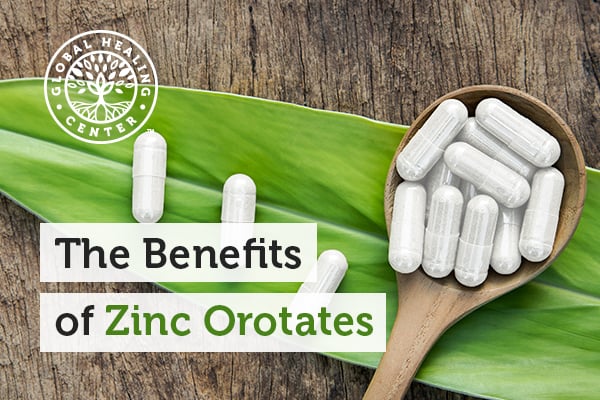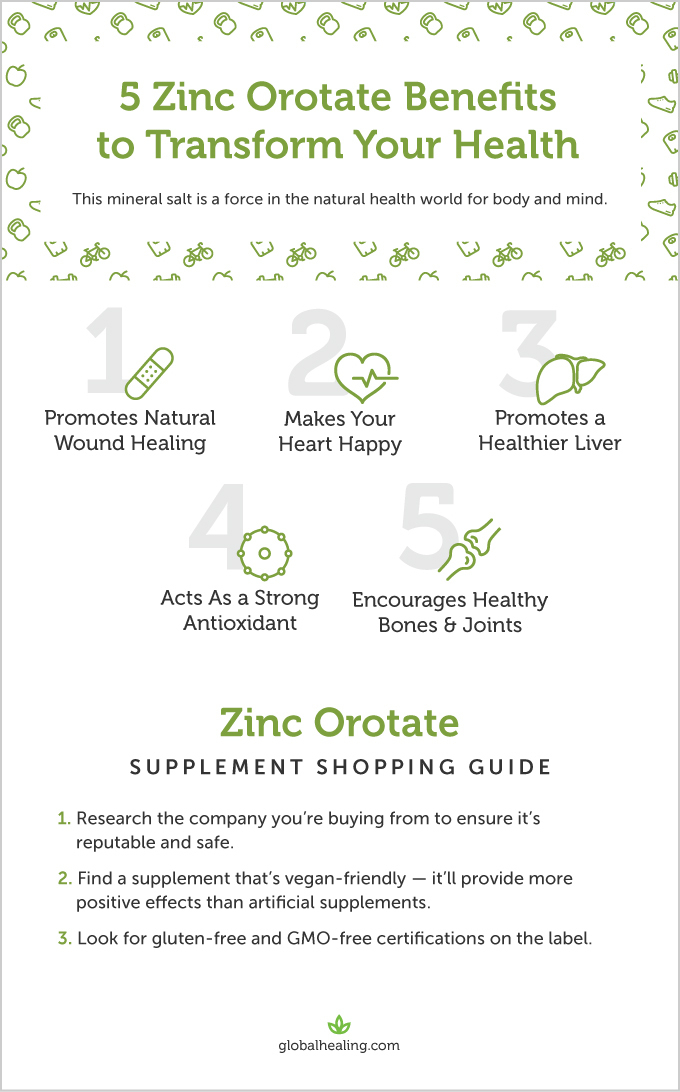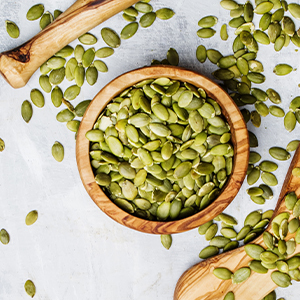
We’ve all heard about zinc — the trace element that gives our bodies a healing boost and supports our physiology. But have you heard of zinc orotate? Its small size enables it to pass through cell membranes easily. This means it’s more highly bioavailable. As a result, zinc orotate is considered the best way to take this essential mineral.
With zinc orotate, you get all the benefits of zinc more quickly and at lower servings: support for your immune system, heart, liver, bones, and joints, plus a normal response to inflammation.
Orotates: The Best Transport Molecules
Orotates are mineral salts of orotic acid. Specifically, an orotate is orotic acid joined to a mineral, like zinc, magnesium, or calcium. The body uses orotic acid for various biochemical reactions. At one point, orotic acid was thought to be part of the B-complex vitamins and was even called B-13 for a while.
Not every molecule can pass through cellular membranes. Because orotic acid is a tiny molecule, it can slip through completely intact — even when combined with a mineral like zinc.[1] As a result, your cells can put zinc — or whatever mineral is attached — to use more quickly. This gives orotates high bioavailability, making them the best transporter molecules for minerals.[2]
Top Benefits of Zinc Orotate
Most of our knowledge comes from the more commonly used forms of zinc, like zinc picolinate or gluconate. However, the existing information base also applies to zinc orotate. Once inside a cell, the mineral detaches from orotic acid, allowing zinc or whatever micronutrient to work in its normal body processes.
These five benefits of zinc orotate reveal why it is an excellent addition to any vitamin and supplement regimen.
Promotes Natural Wound-Healing
It’s inevitable that, over the course of your life, you’re going to end up with an injury. Whether that’s a scrape, cut, or something else, zinc orotate can help you out. It enables your cells to replenish themselves more quickly — meaning less time to heal and get back to your daily life.[3]
Wound healing generally runs through four stages: clotting, inflammation, cellular growth, and new skin formation. Zinc plays a role in every step of the process. It speeds up clotting, it promotes a healthy response to inflammation, and it helps your body build new cells efficiently.[3]
Makes Your Heart Happy
The mineral zinc brings you more than just “good heart vibes.” In the body, zinc helps repair heart tissue and stops damage when issues arise. It keeps your heart younger longer.[4]
Zinc orotate has a hand in promoting normal cholesterol levels, as well. It helps even out “good” HDL and “bad” LDL ratios. If you’re concerned about the health of your arteries and how they’re affected by your diet and lifestyle, zinc orotate might be what you’re looking for.
Zinc supports artery health, promoting a normal level of blood cholesterol and triglycerides (blood fats). When too many fats circulate in the blood, it's harder for blood to move through the arteries as efficiently as it should. Healthier arteries means a healthier heart![5]

Promotes a Healthier Liver
Zinc orotate also helps keep your liver healthy. Your liver acts as a filter, cleaning up the blood coming from your digestive tract before it goes back into your body. This vital organ detoxifies chemical compounds that get into your body. It assists with digestion by producing bile — a substance that breaks down fats into fatty acids — which your body can then digest.
A healthy liver tends to correlate with a healthy amount of zinc in the body. Zinc keeps your liver healthy by boosting immune function, normalizing redness and swelling, and regenerating cells quickly to keep your liver in tip-top shape.[6] If you want to stay on top of your liver health or are concerned about any risk factors, getting enough zinc is a great decision.
Acts as a Strong Antioxidant
Zinc has strong antioxidant properties. Every day, your body engages in millions of normal biochemical reactions, including metabolism. Some of these processes generate “free radicals” — compounds that cause oxidative stress or damage to your cells. Free radicals also get created in the body from environmental toxins, sunlight, and other factors.
Your body makes natural antioxidants — molecules that counteract free radicals — but you can also get more by eating antioxidant-rich foods and herbs or taking nutritional supplements. Zinc is one of the antioxidants in your body that naturally counteracts free radicals. More antioxidants equal healthier cells.
As an antioxidant, zinc helps you experience less redness, swelling, and other issues, especially when tissues get deprived of blood flow and oxygen.[7, 8]
Zinc plays a particularly important role as an antioxidant for the elderly, promoting a normal response to infection and injury.[9] This is just one reason why zinc is used for immune system support every day!
Encourages Healthy Bones & Joints
If you’re struggling with achy joints, taking zinc orotate is a great choice. Most of the zinc in your body is found in your bones. With age comes a normal degeneration in bone health; along with a loss of calcium, the zinc levels in your bones naturally decrease. But don’t worry — you can get it back.[10]
Taking zinc supplements promotes normal bone health, keeping you active in your later years.[10] Thanks to the role that zinc plays in supporting the body's healthy response to inflammation, it can also relieve some discomfort and help your joints move more easily.
How to Find a Quality Zinc Orotate Supplement
If you’re looking for zinc mineral supplements, do your research to make sure the company you’re buying from is reputable. High-quality supplements will be gluten-free, vegan-friendly, and free from fillers.
Groups at risk of zinc deficiency or inadequacy include vegetarians, those with gastrointestinal diseases that affect absorption of nutrients, pregnant and lactating women, and alcoholics. If you are in one of these groups, you can reach out to a dietitian or qualified healthcare professional, but rest assured zinc is a safe nutrient for all. As an essential mineral, zinc is safe for children and adults alike.
Points to Remember
Zinc is an essential trace mineral used in the body for several body processes. When minerals like zinc are paired with orotic acid, it becomes an “orotate.” Orotates can more readily cross cell membranes due to their small size, allowing the essential micronutrient to work more quickly and more efficiently.
Zinc orotate has many benefits, including promoting natural wound healing, a strong heart and liver, flexible joints, and healthy bones.[11] Zinc also promotes a normal response to inflammation, whether in wounds or joints.
References (11)
- Sharpe E. Orotates And The Mineral Transporters Of Dr. Hans Nieper. In Oasis Advanced Wellness Blog. Published 13 Aug 2018. Accessed 8 Aug 2019.
- Andermann G, Dietz M. The bioavailability and pharmacokinetics of three zinc salts: zinc pantothenate, zinc sulfate and zinc orotate. Eur J Drug Metab Pharmacokinet. 1982;7(3):233-239.
- Lin PH, et al. Zinc in wound healing modulation. Nutrients. 2017 Dec 24;10(1).
- Little PJ, et al. Zinc and cardiovascular disease. Nutrition. 2010 Nov-Dec;26(11-12):1050-1057.
- Ranasinghe P, et al. Effects of zinc supplementation on serum lipids: a systematic review and meta-analysis. Nutr Metab (Lond). 2015 Aug 4;12:26.
- Mohammad MK, et al. Zinc and liver disease. Nutr Clin Pract. 2012 Feb;27(1):8-20.
- Lee SR. Critical role of zinc as either an antioxidant or a prooxidant in cellular systems. Oxid Med Cell Longev. 2018 Mar 20;2018:9156285.
- Powell SR. The antioxidant properties of zinc. J Nutr. 2000 May;130(5S Suppl):1447S-1454S.
- Prasad AS. Zinc is an antioxidant and anti-Inflammatory agent: its role in human health. Front Nutr. 2014; 1:14.
- Atik OS, et al. Etiology of senile osteoporosis: a hypothesis. Clin Orthop Relat Res. 2006 Feb;443:25-27. Review.
- Zinc: Fact Sheet for Health Professionals. Office of Dietary Supplements, National Institutes of Health. Updated 10 Jul 2019. Accessed 31 Jul 2019.
†Results may vary. Information and statements made are for education purposes and are not intended to replace the advice of your doctor. If you have a severe medical condition or health concern, see your physician.







